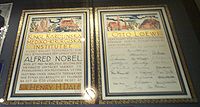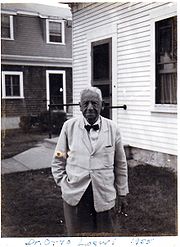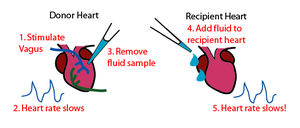- Otto Loewi
-
Otto Loewi
Born June 3, 1873
Frankfurt, GermanyDied December 25, 1961 (aged 88)
New York City, United StatesNationality Austria, Germany, United States Fields Pharmacology Alma mater University of Strasbourg Known for Acetylcholine Notable awards Nobel Prize in Physiology or Medicine (1936) Otto Loewi (3 June 1873 – 25 December 1961) was a German born pharmacologist whose discovery of acetylcholine helped enhance medical therapy. The discovery earned for him the Nobel Prize in Physiology or Medicine in 1936 which he shared with Sir Henry Dale, whom he met in 1902 when spending some months in Ernest Starling's laboratory at University College, London. He has been referred to as the "Father of Neuroscience."
Contents
Biography
Loewi was born in Frankfurt, Germany. He received his medical doctoral degree from University of Strasbourg (then part of Germany) in 1896 where he also was a member of the fraternity Burschenschaft Germania Strassburg. During 1897-1898 he was assistant to Carl von Noorden, clinician at the City Hospital in Frankfurt. Soon, however, after seeing the high mortality in countless cases of far-advanced tuberculosis and pneumonia, left without any treatment because of lack of therapy, he decided to drop his intention to become a clinician and instead to carry out research in basic medical science, in particular pharmacology. In 1898, he succeeded in becoming an assistant of Professor Hans Horst Meyer, the renowned pharmacologist at the University of Marburg, from 1904 Professor of Pharmacology in Vienna. In 1905, Loewi became Associate Professor at Meyer's laboratory, and in 1909 he was appointed to the Chair of Pharmacology in Graz.
During his first years in Marburg, Loewi's studies were in the field of metabolism. As a result of his work on the action of phlorhizin, a glucoside provoking glycosuria, and another one on nuclein metabolism in man, he was appointed «Privatdozent» (Lecturer) in 1900. Two years later he published his paper «Über Eiweisssynthese im Tierkörper» (On protein synthesis in the animal body), proving that animals are able to rebuild their proteins from their degradation products, the amino acids - an essential discovery with regard to nutrition. Loewi investigated how vital organs respond to chemical and electrical stimulation. He also established their relative dependence on epinephrine for proper function. Consequently, he learnt how nerve impulses are transmitted by chemical messengers. The first chemical neurotransmitter that he identified was acetylcholine.
In 1903, he accepted an appointment at the University of Graz in Austria, where he would remain until being forced out of the country in 1938. In 1905 he received Austrian citizenship.
He married Guida Goldschmiedt in 1908. They had three sons and a daughter. He was the last Jew hired by the University between 1903 and the end of the war.
After being arrested, along with two of his sons, on the night of the German invasion of Austria, March 11, 1938, Loewi was released on condition that he "voluntarily" relinquish all his possessions to the Nazis. Loewi moved to the United States in 1940, where he became a research professor at the New York University College of Medicine. In 1946, he became a naturalized citizen of the United States. In 1954, he became a Foreign Member of the Royal Society. He died in New York City on December 25, 1961.
Shortly after Loewi's death in late 1961, his youngest son bestowed the gold Nobel medal on the Royal Society in London. He gave the Nobel diploma to the University of Graz in Austria in 1983, where it currently resides, along with a bronze copy of a bust of Loewi. The original of the bust is at the Marine Biological Laboratory in Woods Hole, Massachusetts, Loewi's summer home from his arrival in the US until his death.
Research
 The Nobel Prize diploma of Otto Loewi, housed at the University of Graz
The Nobel Prize diploma of Otto Loewi, housed at the University of Graz
Before Loewi's experiments, it was unclear whether signalling across the synapse was bioelectrical or chemical. Loewi's famous experiment, published in 1921, largely answered this question. According to Loewi, the idea for his key experiment came to him in his sleep. He dissected out of frogs two beating hearts: one with the vagus nerve which controls heart rate attached, the other heart on its own. Both hearts were bathed in a saline solution (i.e. Ringer's solution). By electrically stimulating the vagus nerve, Loewi made the first heart beat slower. Then, Loewi took some of the liquid bathing the first heart and applied it to the second heart. The application of the liquid made the second heart also beat slower, proving that some soluble chemical released by the vagus nerve was controlling the heart rate. He called the unknown chemical Vagusstoff. It was later found that this chemical corresponded to Acetylcholine (Kandel, et al. 2000).
Loewi's investigations “On an augmentation of adrenaline release by cocaine” and “On the connection between digitalis and the action of calcium” were profound concepts and were studied relentlessly by others decades later.
He also clarified two mechanisms of eminent therapeutic importance: the blockade and the augmentation of nerve action by certain drugs.
He is almost as famous for the means by which the idea for his experiment came to him as he is for the experiment itself. On Easter Saturday 1923, he dreamed of an experiment that would prove once and for all that transmission of nerve impulses was chemical, not electrical. He woke up, scribbled the experiment onto a scrap of paper on his night-stand, and went back to sleep.
The next morning he arose very excited because he knew this dream had been very important. But he found, to his horror, that he couldn't read his midnight scribbles. That day, he said, was the longest day of his life, as he could not remember his dream. That night, however, he had the same dream. This time, he immediately went to his lab to perform the experiment.[1] From that point on, the consensus was that the Nobel was not a matter of "if" but of "when."
Thirteen years later, Loewi was awarded the Nobel Prize in Physiology or Medicine, which he shared with Sir Henry Hallett Dale.
References
- ^ O. Loewi (1921) "Über humorale Übertragbarkeit der Herznervenwirkung. I." Pflügers Archiv, 189, pp. 239-242 doi:10.1007/BF01731235
- Raju, T N (1999), "The Nobel chronicles. 1936: Henry Hallett Dale (1875-1968) and Otto Loewi (1873-1961).", Lancet 353 (9150): 416, 1999 Jan 30, PMID 9950485
- Lembeck, F (1973), "[Otto Loewi--a scientist against his contemporary background (author's transl)]", Wien. Klin. Wochenschr. 85 (42): 685–6, 1973 Oct 19, PMID 4587917
- Babskiĭ, E B (1973), "[Otto Loewi (on the 100th anniversary of his birth]", Fiziologicheskiĭ zhurnal SSSR imeni I. M. Sechenova 59 (6): 970–2, 1973 Jun, PMID 4583680
See also
- List of Jewish Nobel laureates
External links
- Nobel Lectures, Physiology or Medicine 1922-1941, Elsevier Publishing Company, Amsterdam, 1965.
- Kandel ER, Schwartz JH, Jessell TM. Principles of Neural Science, 4th ed. McGraw-Hill, New York (2000). ISBN 0-8385-7701-6
- Otto Loewi Biography. Nobel Foundation.
- From the Workshop of Discoveries Porter Lecture at the University of Kansas, 1953 (University of Kansas Press, Lawrence, 1953). Full-text PDF file.
See also: LoewiNobel Laureates in Physiology or Medicine (1926–1950) Johannes Fibiger (1926) · Julius Wagner-Jauregg (1927) · Charles Nicolle (1928) · Christiaan Eijkman / Frederick Gowland Hopkins (1929) · Karl Landsteiner (1930) · Otto Warburg (1931) · Charles Scott Sherrington / Edgar Adrian (1932) · Thomas Morgan (1933) · George Whipple / George Minot / William Murphy (1934) · Hans Spemann (1935) · Henry Dale / Otto Loewi (1936) · Albert Szent-Györgyi (1937) · Corneille Heymans (1938) · Gerhard Domagk (1939) · Henrik Dam / Edward Doisy (1943) · Joseph Erlanger / Herbert Gasser (1944) · Alexander Fleming / Ernst Chain / Howard Florey (1945) · Hermann Muller (1946) · Carl Cori / Gerty Cori / Bernardo Houssay (1947) · Paul Müller (1948) · Walter Hess / António Egas Moniz (1949) · Edward Kendall / Tadeus Reichstein / Philip Hench (1950)
Complete list · (1901–1925) · (1926–1950) · (1951–1975) · (1976–2000) · (2001–2025) Categories:- Jewish scientists
- Jewish inventors
- German neuroscientists
- American neuroscientists
- German pharmacologists
- Nobel laureates in Physiology or Medicine
- German Nobel laureates
- Ludwig Maximilian University of Munich alumni
- German expatriates in Austria
- German emigrants to the United States
- Naturalized citizens of the United States
- German Jews
- American people of German-Jewish descent
- People from Frankfurt
- People from Hesse-Nassau
- Foreign Members of the Royal Society
- 1873 births
- 1961 deaths
- University of Strasbourg alumni
- University of Strasbourg faculty
Wikimedia Foundation. 2010.


